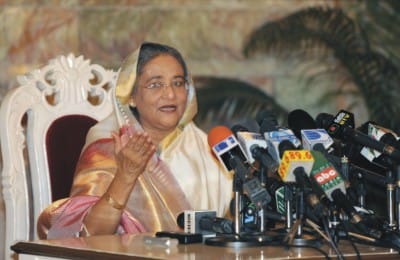True change

The onus is on her.Photo: AFP
SHEIKH Hasina has not only talked about din badal (change), she is determined to implement. One should not bother about whether she got it from Obama or whether it was her real desire to bring about changes in Bangladesh politics following 1/11. The situation before 1/11 called for a real change from hartal, forced closure of business and industries, destruction of private and government properties by political mobs, parliament boycott, etc.
New faces
She has formed a cabinet that reflected real change. All except two are new faces in the cabinet, and many do not have any previous experience of running a government office. However, it is true that they are all educated and have experience in different professions.
I agree with Mahfuz Anam's observation that the important ministry of industries will be run by a person who had "spent his life castigating industrialists as exploitative capitalists," which may create doubts in the minds of the investors. Of course, the people would expect a change of mindset of the concerned minister(s) in the light of the changes around the world.
Here, the role of the prime minister will be crucial. The ministers will have to go by the policy decisions of the government and not by individual conviction. The well-justified argument is that one must be in the job to learn it.
Huge responsibilities
The massive victory of Awami League-led mohajote has placed huge responsibilities on Sheikh Hasina's government.
One of the new ministers, Syed Ashraful Islam, came out with a very strong and indeed timely statement: "We will put an end to politicisation of all institutions, including the judiciary, Public Service Commission, and Election Commission to make the administration efficient." He also promised that: "The new government will free the administration from politicisation to fulfill the expectations of the people." The people expect the government to strictly follow this, which can really bring change.
Permanent civil service
It is high time to emphasise that the bureaucracy is not a part of any political party. Any over-enthusiasm on the part of the bureaucracy is sycophancy, which must be uprooted totally. Indeed, sycophancy has nearly destroyed the bureaucracy and brought the administration to an unacceptable situation.
The British Raj left us with one important institution, which is the permanent civil service. Politicians come and go, but the permanent civil service continues to function and serve the people. Indeed, the politicians receive regular briefings from the civil service about what happened in the previous administration. It is the responsibility of the civil service to do the job to maintain the continuity of the administration. If they align with political party(s), then the administration is bound to suffer.
The bureaucracy cannot be allowed to side with any particular political party at any time. But some civil service members do align with a political party(s) to obtain undue benefits, including promotions and re-employment after retirement. This destroys the neutrality of the civil service.
Such an unethical axis in the administration also increased corruption in the business circle. There has always been the complaint that businessmen cannot get anything done without paying bribes to such an evil axis. Such practices delay decision-making and lead to severe harassment for the businessmen (though it is also a fact that some businessmen go for such bribing in order to get things done).
Bangabandhu's legacy
Prime Minister Sheikh Hasina is fully aware of her position and responsibilities as the daughter of Bangabandhu, and she must try to fulfill Bangabandhu's dream and ideals by giving the country an honourable position in the world theatre. Bangabandhu must be re-established in his rightful position, which was disturbed during the last ten years. This has to be done not by naming roads, bridges and anything else in his name, but by bringing in total change in politics and administration so that Bangabandhu's legacy could be well established. She owes this to this nation.
Senior party members
The experience of those senior politicians who were not included in the cabinet should be suitably utilised, as they can really contribute to the parliamentary committees as chairs and members. They could really be stronger than the ministers as the incumbent ministers will be legally bound to explain their work and conduct to such parliamentary committees.
If the parliamentary committees work efficiently, there could be real balance in the administration, as experienced MPs could easily identify the loopholes in administration for necessary corrections.
Commitment has been made to give the positions of deputy speaker and chairs of some parliamentary committees to the opposition members so that their services could be effectively utilised for making the parliament the centre of all democratic activities.
PM and opposition leader
Finally, an appeal to the PM and to the leader of the opposition to talk on major national issues. Whatever the differences in their political philosophies, they should sit together to discuss major issues confronting the country. Sheikh Hasina, being the prime minister, should take the initiative. Several citizens have already insisted on it. Let's hope that the process starts right away. This should be a part of Sheikh Hasina's din badal.

 For all latest news, follow The Daily Star's Google News channel.
For all latest news, follow The Daily Star's Google News channel. 



Comments